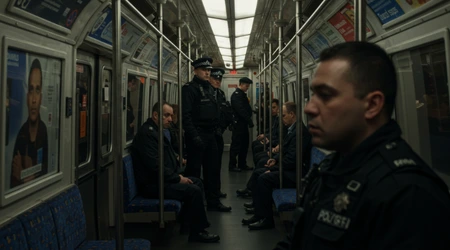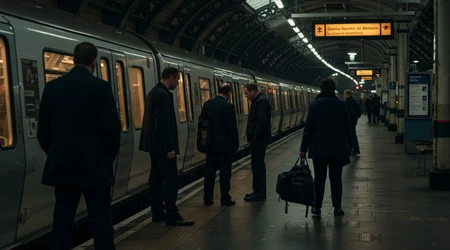New TV Drama Revisits Jean Charles de Menezes Case After 7/7 Attacks

The Jean Charles de Menezes case remains a haunting chapter in Britain’s modern history, a stark reminder of the delicate balance between national security and individual rights.
On 22 July 2005, two weeks after the devastating 7/7 London bombings, Brazilian electrician Jean Charles de Menezes was fatally shot by Metropolitan Police officers at Stockwell Underground station, mistaken for a terrorist.
Now, in 2025, a new Disney+ drama, Suspect: The Shooting of Jean Charles de Menezes, brings this tragedy back into focus, prompting fresh scrutiny of police accountability, systemic failures, and the human cost of fear-driven decisions.
This four-part series, launching on 30 April 2025, is more than a retelling it’s a call to confront uncomfortable truths.
Why do we still grapple with the same questions of justice and trust two decades later?
This column explores the Jean Charles de Menezes case through the lens of the new drama, weaving together its narrative power, historical context, and contemporary relevance.
Drawing on real events, public inquiries, and the voices of those affected, the series challenges viewers to rethink the cost of security.
With a stellar cast, meticulous research, and a commitment to truth, Suspect aims to honor de Menezes’s memory while exposing the flaws that led to his death.
Below, we delve into the drama’s impact, the case’s lasting legacy, and what it means for Britain today, grounded in verified facts and a humanized perspective.
The Drama’s Bold Approach to a Painful Truth
Suspect doesn’t shy away from the raw reality of the Jean Charles de Menezes case.
Written by Jeff Pope, known for fact-based dramas like Philomena, the series reconstructs the chaotic days post-7/7, capturing the paranoia that gripped London.
Edison Alcaide stars as de Menezes, portraying him as a vibrant young man, not a faceless victim.
The drama’s strength lies in its multi-perspective storytelling police, family, media offering a nuanced view of a tragedy born from missteps.
Pope’s script draws on public inquiries, including two by the Independent Police Complaints Commission (IPCC). This ensures accuracy, avoiding sensationalism.
For example, the series depicts the fateful misidentification: de Menezes lived in the same block of flats as a bombing suspect, a detail that fueled the police’s error.
++ Publication of Foreign Criminals Awaiting Deportation Sparks Political Debate
Such precision grounds the drama in reality, making its emotional weight authentic.
The cast, including Emily Mortimer as Cressida Dick, then a commander, adds gravitas. Mortimer’s portrayal humanizes Dick, showing her under pressure, not as a villain.
This approach avoids caricature, inviting viewers to grapple with systemic issues over individual blame. The series asks: how do fear and flawed systems collide to produce such outcomes?

Historical Context: A Nation on Edge
To understand the Jean Charles de Menezes case, we must revisit 2005. The 7/7 attacks killed 52 people, shattering London’s sense of safety.
Two weeks later, a failed bombing attempt heightened tensions. Police were under immense pressure to prevent another attack, operating in a climate of fear and urgency.
This context, while not excusing the tragedy, explains the high-stakes environment.
The IPCC’s 2007 report revealed critical failures: poor communication, unclear surveillance protocols, and rushed decisions.
Also read: How British Politics is Impacting Daily Life
Officers mistook de Menezes for Hussain Osman, a suspect, based on flimsy visual similarities.
The report noted no officer faced prosecution, though the Met was fined £175,000 for breaching health and safety laws.
This statistic underscores the lack of individual accountability, a point Suspect explores through tense dramatizations.
Imagine a tightrope walker, balancing security and liberty, wobbling under public pressure. That’s the Met in 2005 caught between duty and disaster.
The drama recreates this tension, showing how fear can distort judgment. It also highlights the human toll: de Menezes’s family, consultants for the series, share their grief, amplifying the story’s authenticity.
The series doesn’t just recount events; it questions the narrative. Early police claims de Menezes wore a bulky jacket, jumped barriers were debunked.
Suspect corrects these lies, aligning with the family’s fight for truth. This commitment to accuracy makes the drama a powerful historical corrective.
Read more: The UK’s Relationship with the US: Stronger or Weaker?
The Human Cost and Family’s Voice
Maria de Menezes, Jean’s mother, calls Suspect essential viewing, a sentiment echoing her decades-long quest for justice.
The Jean Charles de Menezes case wasn’t just a police error; it was a personal devastation.
Maria, who watched the series, felt ill for days, yet praised its truthfulness. Her involvement as a consultant ensures the drama honors her son’s humanity.
The series portrays de Menezes’s life his dreams, his work as an electrician before his death.
This humanization counters the media’s initial portrayal of him as a potential threat.
For example, a scene shows him joking with friends, a creative choice that grounds his character in everyday relatability. It’s a reminder: he was no different from us.
Maria’s perspective adds emotional depth. In a 2025 Mirror interview, she expressed relief at the series exposing police lies.
Her forgiveness, though difficult, reflects resilience. Suspect amplifies this, showing her at Stockwell station, a mosaic of Jean nearby, symbolizing a community’s loss.
The drama also explores the family’s legal battles. No officers were prosecuted, but the Met’s fine offered little closure.
Suspect uses this to question justice systems, asking viewers to consider what accountability looks like. It’s a narrative that resonates with families of other victims of state errors.
Media’s Role and Public Perception
The Jean Charles de Menezes case exposed media complicity in spreading misinformation. Initial reports, fed by police, painted de Menezes as suspicious claims later disproved.
Suspect critiques this, showing journalists grappling with conflicting narratives. This subplot mirrors today’s debates on media responsibility in high-stakes cases.
For instance, the drama includes a fictional reporter, inspired by real 2005 coverage, who questions the police’s story. This creative addition highlights the press’s role in shaping public perception.
It’s a subtle nod to the need for skepticism, especially when official accounts falter. The series asks: who shapes the truth?
Public reaction to the case was mixed. Some saw de Menezes as collateral damage in a terror war; others demanded reform.
Suspect reflects this divide, showing protests and police defenses. A 2008 YouGov poll found 48% of Britons felt the Met’s actions were justified, revealing societal tensions the drama explores.
This focus on perception connects to 2025’s media landscape. With social media amplifying narratives, Suspect reminds us to question sources.
It’s a timely lesson, as trust in institutions wanes. The series uses the case to probe how fear shapes stories, a theme as relevant now as in 2005.
Systemic Issues and Modern Relevance
The Jean Charles de Menezes case wasn’t an isolated incident it exposed systemic flaws in policing. Suspect delves into these: inadequate training, rushed decisions, and racial profiling.
De Menezes, a Brazilian, was misidentified partly due to assumptions about his appearance, a point the drama underscores without preaching.
The series connects to today’s debates on police reform. In 2025, the Met faces scrutiny over stop-and-search disparities, with Black and minority ethnic individuals disproportionately targeted.
Suspect draws parallels, showing how fear-driven policies can erode trust. It’s a call to address these issues before more lives are lost.
Consider a house built on a shaky foundation each crack risks collapse. That’s Britain’s policing system post-2005, still grappling with accountability.
Suspect uses the Jean Charles de Menezes case to highlight this, urging reform. Its release, amid ongoing debates, makes it a catalyst for dialogue.
The drama also explores leadership failures. Cressida Dick, later Met commissioner, faced criticism for her role.
Suspect portrays her decisions under pressure, prompting viewers to question top-down accountability. This resonates in 2025, as public trust in police leadership remains fragile.
Table: Key Facts of the Jean Charles de Menezes Case
| Date | Event | Outcome |
|---|---|---|
| 7 July 2005 | 7/7 London bombings kill 52 | Heightened security measures |
| 21 July 2005 | Failed bombing attempt | Increased police vigilance |
| 22 July 2005 | De Menezes shot at Stockwell station | Seven shots fired, mistaken identity |
| 2007 | IPCC report criticizes Met failures | No officers prosecuted |
| 2008 | Met fined £175,000 for safety breaches | Family continues justice campaign |
A Catalyst for Change?
Can a TV drama change how we view the Jean Charles de Menezes case? Suspect aims to do just that, blending storytelling with advocacy.
By centering de Menezes’s humanity and exposing systemic errors, it challenges viewers to demand better. Its release, as the 20th anniversary of 7/7 nears, is timely.
The series’ impact depends on its reach. Disney+’s global platform ensures millions will see it, potentially reshaping perceptions.
For example, a scene showing de Menezes’s final moments ordinary, then tragic could spark empathy in ways reports never did. It’s storytelling as activism.
Yet, dramas alone can’t fix systems. Suspect must inspire action policy reviews, public pressure.
The Met’s 2025 apology, reiterated in response to the series, is a start, but words aren’t enough. The drama’s legacy hinges on whether it galvanizes reform.
Maria de Menezes’s hope that “everyone should watch” carries weight. If Suspect moves viewers to question authority and seek justice, it honors Jean’s memory.
As Britain navigates security and rights in 2025, this drama is a mirror, reflecting past mistakes and future possibilities.

Conclusion: A Story That Demands to Be Heard
The Jean Charles de Menezes case is more than a historical footnote it’s a wound that still stings, a lesson unlearned.
Suspect: The Shooting of Jean Charles de Menezes doesn’t just retell this tragedy; it demands we confront its implications.
Through meticulous storytelling, it honors a man whose life was cut short by fear and error.
Its cast, from Alcaide’s poignant de Menezes to Mortimer’s complex Dick, brings humanity to a story too often reduced to headlines.
As we watch, we’re asked to reflect: how do we balance security and justice?
The series, grounded in real inquiries and family voices, offers no easy answers but insists we keep asking. In 2025, with trust in institutions faltering, Suspect is a clarion call for accountability, empathy, and change.
Maria de Menezes’s plea resonates: this is a story everyone should see, not just for Jean, but for the society we hope to build.
Frequently Asked Questions
What is Suspect: The Shooting of Jean Charles de Menezes about?
It’s a Disney+ drama exploring the 2005 shooting of Jean Charles de Menezes, focusing on police errors, family grief, and systemic issues.
When does the series premiere?
All four episodes launch on Disney+ on 30 April 2025, exclusively in the UK and Ireland.
Is the drama factually accurate?
Yes, it’s based on IPCC reports and family consultations, ensuring a truthful depiction of events.
Why is the Jean Charles de Menezes case still relevant?
It highlights ongoing issues like police accountability, racial profiling, and the balance between security and civil rights in 2025.
